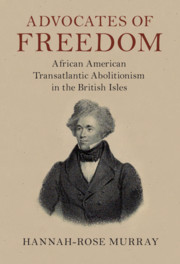Book contents
- Advocates of Freedom
- Slaveries since Emancipation
- Advocates of Freedom
- Copyright page
- Contents
- Figures
- Acknowledgments
- Dedication
- Introduction
- 1 “It Is Time for the Slaves to Speak”
- 2 “All the Bloody Paraphernalia of Slavery”
- 3 “[They Have] Not Ceased to Hold My Hand Since”
- 4 To “Frighten the Hyena Out of His Ferocity”
- 5 “I Would Much Rather Starve in England, a Free Woman, Than Be a Slave”
- 6 “Have No Fellowship I Pray You, with These Merciless Menstealers”
- 7 “My Name Is Not Tom”
- 8 “The Black People’s Side of the Story”
- Conclusion
- Bibliography
- Index
8 - “The Black People’s Side of the Story”
Ida B. Wells and the Anti-lynching Crusade in Britain 1893–1894
Published online by Cambridge University Press: 07 September 2020
- Advocates of Freedom
- Slaveries since Emancipation
- Advocates of Freedom
- Copyright page
- Contents
- Figures
- Acknowledgments
- Dedication
- Introduction
- 1 “It Is Time for the Slaves to Speak”
- 2 “All the Bloody Paraphernalia of Slavery”
- 3 “[They Have] Not Ceased to Hold My Hand Since”
- 4 To “Frighten the Hyena Out of His Ferocity”
- 5 “I Would Much Rather Starve in England, a Free Woman, Than Be a Slave”
- 6 “Have No Fellowship I Pray You, with These Merciless Menstealers”
- 7 “My Name Is Not Tom”
- 8 “The Black People’s Side of the Story”
- Conclusion
- Bibliography
- Index
Summary
Chapter 8 focuses on Ida B. Wells’ transatlantic visits to Britain in 1893 and 1894. I argue that Wells, like Henson, exploited adaptive resistance in a new era, but this time redeployed its attention to the legacy of slavery, particularly lynching and racial violence. She sustained the Black protest tradition until the end of the nineteenth century and borrowed from it to create a successful tour in 1894, in particular. Learning from previous activists such as Frederick Douglass, Wells befriended newspaper editors, collected favorable coverage of her lectures, orchestrated interviews in numerous papers, and cultivated reformist networks to raise awareness of lynching. Wells also used a form of visual dissonance within her employment of adaptive resistance: she used photographs of lynched bodies to convince the British people of racial violence, and passed the image around at small meetings as a tool of truth to support her rhetoric. She intervened in traditional white spaces such as Parliament to sustain the Black American protest tradition and remind British audiences they lived and breathed a legacy of slavery.
Keywords
- Type
- Chapter
- Information
- Advocates of FreedomAfrican American Transatlantic Abolitionism in the British Isles, pp. 292 - 317Publisher: Cambridge University PressPrint publication year: 2020

